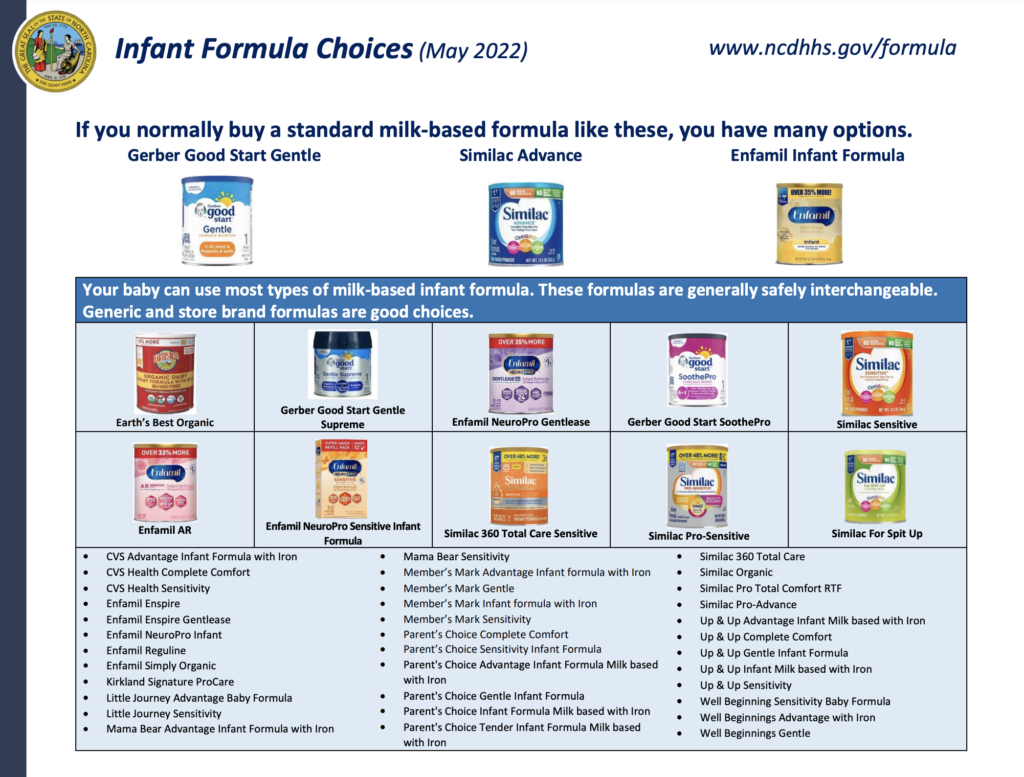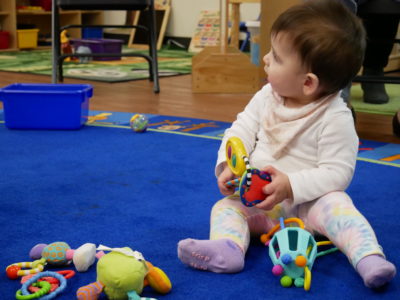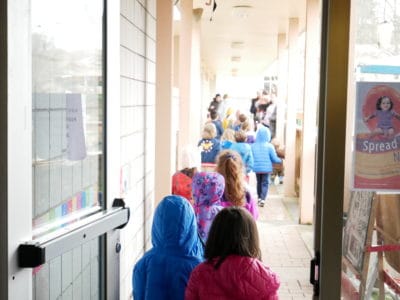

Share this story
- There are safe alternatives to common formula options for families, @ncdhhs says. If your family is struggling during the shortage, here are resources to find formula and answers to commonly asked questions.
- Where can I find baby formula? What are state and federal governments doing to ease the shortage? If your family is struggling to find formula during the shortage, here's what you need to know.
Some families have had trouble finding baby formula amid the Abbott Nutrition recall and supply chain issues. But there are safe alternatives and resources for finding formula.
Lindsay Saunders, communications director for the N.C. Early Childhood Foundation, described checking six to nine stores last month in search of formula for her infant.
Yet Saunders said she and her husband were not yet out of stock. Others don’t have the ability to plan ahead and have other barriers to accessing formula, Saunders said. Plus, the shortage has gotten worse over the last month.
If your family is struggling due to the formula shortage, here’s what you can do.
Information from DHHS
The N.C. Department of Health and Human Services (DHHS) released tip sheets last week for families, caregivers, and health care providers in Spanish and English. The department wants to stress that there are safe alternatives to common formula options for families, said DHHS press assistant Summer Tonizzo in an emailed statement.
The following image is a screenshot of one of those tip sheets. It shows alternatives if you normally buy a standard milk-based formula. The second image gives suggestions for families who normally use soy-based formula.




How to find formula
The United Way has a 2-1-1 hotline to connect people with health and human services resources in their community. DHHS said United Way employees can help you find local organizations or food pantries that might have formula.
DHHS recommends considering breastfeeding more often if you are combining breastfeeding and formula.
DHHS also lists contact information for manufacturers you can call for help finding formula:
- MyGerber Baby Expert — parenting experts who can give advice on lactation, switching to solids, and more.
- Abbott’s Customer Service: 1-877-4Abbott or 1-800-986-8540 (for recall specific information)
- Abbott’s product request line and form for metabolic formulas
- Reckitt’s (Mead Johnson) Customer Service line: call 1-800 BABY-123 (222-9123)
If your baby is one of the 50% of infants across the state enrolled in WIC (the Special Supplemental Nutrition Program for Women, Infants and Children), DHHS recommends calling your local WIC agency for places to find formula. You can find grocers and pharmacies that accept WIC here and find out if you are eligible for WIC here.
Additionally, WakeMed Mothers’ Milk Bank is the one milk bank in North Carolina accredited by the Human Milk Banking Association of North America. The bank mainly uses the donated milk for premature babies and babies with a prescription. You can go here to learn more about donating milk. The Charlotte Observer reported that the bank is not able to distribute milk just because of the shortage, according to a spokesperson for the bank.
You can also sign up for this newsletter from nonprofit MomsRising for updates on news and resources related to the shortage in North Carolina. You can find more tips and best practices from this FAQ from pediatrician Dr. Steven A. Abrams and this guide from the Academy of Breastfeeding Medicine.
Things to avoid
Some infants need specific formula to manage or treat medical options. DHHS recommends talking to your health care provider if you are unsure what to use.
DHHS is warning against making your own formula, watering down formula, switching to toddler formula too soon, or buying formula from informal sources.
From DHHS’s guidance to families:
– Do NOT make homemade infant formula. Homemade formula recipes can be very dangerous for babies since they have not been evaluated by the FDA and may lack nutrients vital to an infant’s growth.
– Do NOT water down formula to stretch it out; it can be extremely dangerous to your baby to do so. Always follow formula label instructions or those given to you by your health care provider.
– Toddler formula and plant-based milk alternatives are not recommended before a child’s first birthday.
– Do NOT buy formula from online auctions, unknown individuals, or unknown origins. Storage and shipping conditions may impact formula safety. Formula from outside the United States is not regulated by the FDA, though the FDA is now exploring safe options for importing formula from other countries.
Importing formula
President Joe Biden has invoked the Defense Production Act to try to boost the supply of formula in the United States, and his administration is also working on importing formula. Exactly when formula from the “Operation Fly Formula” initiative will make it to North Carolina is unclear, Tonizzo said in an emailed statement. She also discouraged families from stockpiling formula.
Here is the full statement from DHHS:
Formula supply is an evolving situation. Many families are having trouble finding their usual formula, and some have needed to visit multiple stores. Families can help this situation by purchasing only the formula that they need for the next two weeks. NCDHHS is closely monitoring supply, working with the federal government, manufacturers, and retailers to get more formula on North Carolina shelves. We continue to monitor the federal Operation Fly Formula but do not have additional details at this time about what North Carolina may receive or when.
Our goal is to ensure safe and nutritious options for North Carolina families, and the NCDHHS team has been actively working on several fronts. NCDHHS created and distributed a flyer to help families understand their formula options, and it is being shared with retailers, providers, and directly with families. NCDHHS is also helping Special Supplemental Nutrition Program for Women, Infants, and Children (WIC) agencies to order needed specialty formula directly from manufacturers, though the amount received depends on availability. NCDHHS is using flexibilities from federal partners and manufacturers so that families participating in the WIC program will have more formula choices during this shortage. About 50% of infants are enrolled in WIC.




